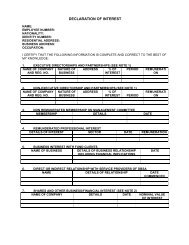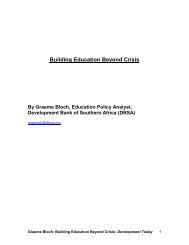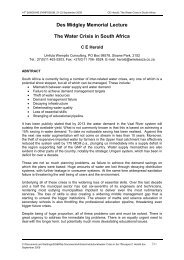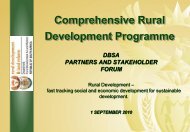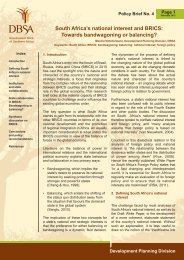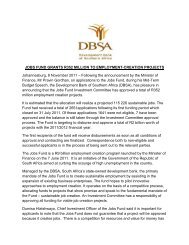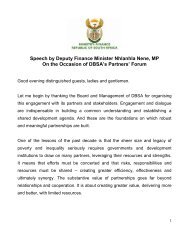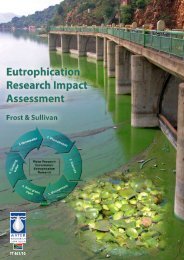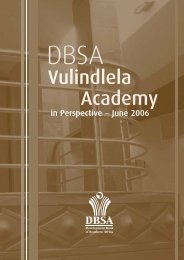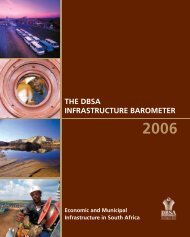A Knowledge Strategy
A Knowledge Strategy
A Knowledge Strategy
Create successful ePaper yourself
Turn your PDF publications into a flip-book with our unique Google optimized e-Paper software.
4.2.7 Leveraging knowledge in high-impact areas<br />
The knowledge management statement of opportunity describes the most<br />
effective knowledge tools that should be used by the DBSA, and recommends the<br />
internal work processes where the knowledge management can be of maximum<br />
impact and return on investment. The prioritisation of activities for the pilot<br />
project is based on relative strategic importance, linkages with key organisational<br />
initiatives, costs and time required for implementation.<br />
4..2.8 Leadership<br />
The dual task of leadership is to champion knowledge management as a vital<br />
component of existing business processes and programmes and to demonstrate<br />
the collaborative behaviours that support effective knowledge management.<br />
Leadership’s role is to ensure that the strategic objectives of knowledge<br />
management are reflected in their cluster and unit BSCs and that performance in<br />
their areas of responsibility is aligned with the knowledge management objectives.<br />
4.2.9 Balanced Score-Card measures<br />
<strong>Knowledge</strong> management objectives and measures are to be incorporated into the<br />
organisational and cluster BSCs, and knowledge management deliverables and<br />
targets should cascade into unit BSCs in an integrative manner.<br />
4.2.10 Organisational fit and work design<br />
<strong>Knowledge</strong> management outputs and competencies are to be reflected more<br />
definitively in work stream dictionaries and knowledge workers are to be<br />
provided with the appropriate skills. <strong>Knowledge</strong> management roles and<br />
accountabilities are to be clarified and communicated and resources realistically<br />
allocated to multi-functional knowledge management teams.<br />
4.3 Functional roles<br />
The knowledge management accountability model (Figure 2) illustrates the<br />
relative roles for the effective sharing of knowledge, and highlights both the<br />
separate and joint accountability areas for the operational clusters and the<br />
<strong>Knowledge</strong> Management Cluster.<br />
4.3.1 Operations Cluster<br />
• Identify clients’ knowledge needs or opportunities.<br />
• Manage the knowledge management process in the operational areas.<br />
• Participate in the knowledge interventions.<br />
• Implement and validate the knowledge initiative, or asset.<br />
4.3.2 <strong>Knowledge</strong> Management Cluster<br />
• Provide the infrastructure, the capability, the facilitation and the expertise for<br />
an effective knowledge management.<br />
• Participate in the knowledge intervention.<br />
36 Development Bank of Southern Africa



